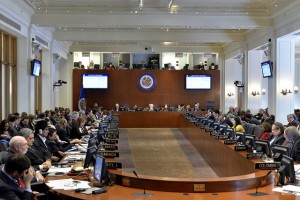
The Permanent Council of the Organisation of American States (OAS) last week debated the current situation in Venezuela and received a preliminary report on the recent visit of the Inter-American Commission on Human Rights (IACHR) to The Dominican Republic, during a regular meeting at the headquarters of the organisation in Washington, DC.
During the meeting, several permanent representatives who expressed their concern over the acts of violence that have taken place in Venezuela in recent days, echoed the call for calm made by the OAS Secretary General José Miguel Insulza, and urged the beginning of a dialogue between the opposition and the government, a position strongly advocated by the OAS secretary general.
Secretary General Insulza appealed last Monday to “the responsibility of the government to avoid the use of force by police or related groups”, and called on the opposition “to demonstrate peacefully, avoiding provocations”.
In addition, the OAS leader emphasised the need for authorities to “respect the freedom of expression and for the media to be conscious of the influential role it plays at this political juncture”.
The representatives of the U.S., Brazil, Peru, Canada, Panama, Venezuela, Ecuador, Chile, Bolivia, Colombia, Mexico, Nicaragua, Dominica, Argentina, Uruguay and Costa Rica, all took the floor during the debate, largely to read statements from their respective governments. The issue was brought up in “other business”, at the request of the U.S.
Purpose of visit
During the same regular meeting, the Permanent Council received a report with the preliminary observations of the IACHR, a product of its visit to The Dominican Republic at the beginning of December, “in response to an invitation from the state”.
“The purpose of the visit was to observe the situation as it pertains to the rights of nationality, identity, equality, non-discrimination, as well as other rights and related issues,” and “to supervise the compliance with the commitments freely assumed by the state of The Dominican Republic in exercise of its sovereignty,” states the document.
The preliminary observations presented at the meeting, whose final version will be presented shortly to the council, were read by IACHR Second Vice Chair and Country Rapporteur for The Dominican Republic, Rosa María Ortiz.
As Commissioner Ortiz explained, her report was based on the press release and the annex to the press release published by IACHR on December 6, upon finishing its visit to the Caribbean country.
During the visit of IACHR, a principal and autonomous organ of the OAS, a central role was played by judgment 0168/2013 of The Dominican Constitutional Court, “whereby it gave a new interpretation as regards the acquisition of nationality by individuals born in the country to foreign parents in transit.
Based on this interpretation, individuals who previously had been recognised as having Dominican nationality were denationalised,” states the document read by Ortiz. This situation particularly affects Haitian immigrants, adds the text.
The delegation of The Dominican Republic, through Mayerlyn Cordero Diaz, alternate representative, took note of the preliminary observations of the IACHR and assured that “the government of The Dominican Republic reaffirms that no person holding Dominican nationality will be stripped of it”, and that Dominican President Danilo Medina will submit to Congress a law to address the situation of 24,392 people who were not declared with proper documentation.



